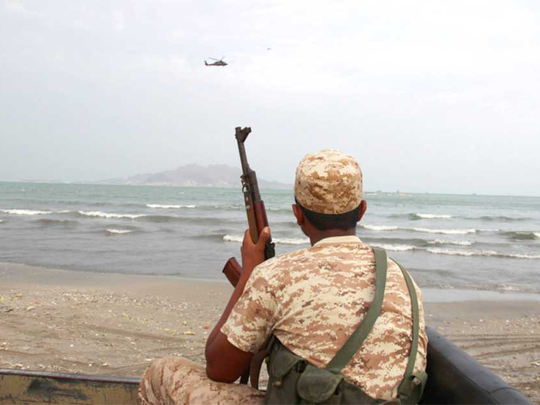
Riyadh: Responding to a UN report accusing both Al Houthis and Saudi-led Arab coalition of crimes in Yemen, coalition spokesman Mohammad Al Mansour said that the bombings in which civilians were killed were “unintended” and blamed UN agencies for not coordinating with the coalition.
Al Mansour, in comments published Friday by the Saudi Press Agency, said a deadly incident in Mokha where 65 civilians, including 10 children were killed was the result of “unintended bombing based on inaccurate intelligence information.”
He recommended that compensation be paid to the victims’ families.
Regarding a second incident in which food trucks managed by the World Food Programme were bombed, Al Mansour said the agency is to blame for not notifying the coalition.
“We always take all necessary measures to ensure the safety of civilians and see to it that the military operation is achieving its objectives with utmost professionalism,” Al Mansour told a news conference in Riyadh Thursday night.
A 14-member investigative team -- made up of Arab coalition states Saudi Arabia, United Arab Emirates, Bahrain, Kuwait, Qatar, as well as Yemen -- probed claims of attacks on a residential area, hospitals, markets, a wedding and World Food Programme aid trucks in Yemen.
Reiterating the coalition’s full commitment to the safety of civilians, he said that Al Houthi militants and Saleh loyalists used a hospital in Saada for military purposes. Four locations in the area are under Al Houthis’ control, he said.
Al Mansour denied reports that the coalition had targeted a hospital in Saada, stressing that the coalition’s strikes were executed with precision.
“The coalition fighter jets targeted an Al Houthi gathering in Taiz, which caused minor damage to a mobile hospital.”
He said that there were no causalities resulting from the strikes on Al Hidan Hospital and that the mobile clinics in Taiz were never attacked.
Addressing claims by the World Food Programme (WFP) about a convoy of trucks being targeted, the Arab Coalition’s spokesperson said the aid organisation did not coordinate with the coalition with regard to the movement of its vehicles in Yemeni territories, nor did they carry any signs indicating that they were WFO trucks. This explains why those trucks were wrongly targeted by the coalition, he explained.
The spokesperson said a coalition strike hit a location used by Al Houthis near the Khamis market, but never targeted the market itself.
“Our inquiries found that the coalition targeted an Al Houthi-controlled site near the market,” he said, adding that the strike took place on a Tuesday when the market witnesses no activities. There was a big Al Houthi gathering in the area at that time, he said.
Moreover, Al Mansour said, the coalition attacked an Al Houthi militia convoy on Thamar highway and not a wedding party.
He said that the 14-member investigative team enjoys complete independence while conducting its investigations into allegations.
“The investigation teams adopt the US and UK accidents assessment methodology as well as the Law of Armed Conflict (LOAC).”
The team works on a case-by-case basis, he said, and prepares a report including facts, analysis and recommendations following each investigation in order to avoid mishaps.
“We analyze the jet fighters’ cockpit recorders and photos taken by reconnaissance planes, in addition to a debriefing by the pilots after daily missions,” he added.












